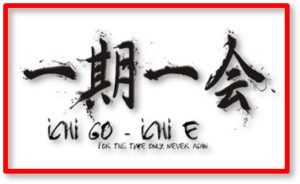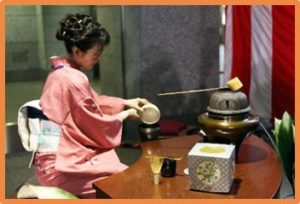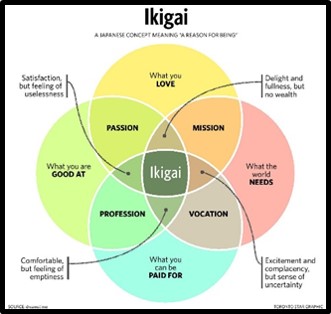Monday Author: Susanne Skinner
 Last month I crossed paths with a wonderful book called Ichigo Ichie, The Art of Making the Most of Every Moment the Japanese Way. Literally translated, the title means ichi (one) go (time) ichi (one) e (meeting/encounter). The concept is from an old Japanese proverb that interprets each moment to be a once-in-a lifetime opportunity, never to be repeated.
Last month I crossed paths with a wonderful book called Ichigo Ichie, The Art of Making the Most of Every Moment the Japanese Way. Literally translated, the title means ichi (one) go (time) ichi (one) e (meeting/encounter). The concept is from an old Japanese proverb that interprets each moment to be a once-in-a lifetime opportunity, never to be repeated.
Written by Hector Garcia and Francesc Miralles, people clearly not Japanese, the book convinced me to see if it would resonate outside of its cultural roots. Life Balance is a favorite topic of mine, and I am always open to ideas.
Ichigo Ichie is a new kind of mindfulness.
Be Like the Buddha
The Buddha teaches life as being impermanent (everything changes), unsatisfactory (left on our own we are never truly happy), and interdependent (all things are linked).
Embedded in Buddhist philosophy, the term ichigo encompasses life from birth to death. Each experience is a singular convergence of time, space, light, feeling, and thought. It is a specific and unrepeatable moment.
Buddhists believe these moments are lived by immersing oneself in them with all five senses. Living life according to the Eightfold Path, also known as the Middle Way, followers will reach enlightenment.
The Readers Digest summary of the eightfold path is an integration of the right thoughts, speech, intent and action, leading to the right mindfulness. By avoiding extremes, we achieve balance, appreciating the present rather than what is behind or in front of us.
Distill that down and you have a guide for living in the moment.
Ancient Philosophy, Modern Life
Ichigo ichie is often spoken in Japan when greeting someone or saying goodbye. It acknowledges each encounter as unique and special. As an element of Zen Buddhist doctrine, it is attributed to a sixteenth-century master of the Japanese tea ceremony, also called a ceremony of attention. The mindful and intricate rituals focus on the present moment.
 Participants share the tea with respect for the tradition, recognizing it will not reoccur in their lifetime.
Participants share the tea with respect for the tradition, recognizing it will not reoccur in their lifetime.
The philosophy speaks to the idea that no single encounter can be rebuilt but all of them hold meaning. Some plant seeds to bear fruit over time while others change the course of life in a single moment.
Modern day spiritual leaders Ekhart Tolle and Ram Dass incorporate a philosophy of “be here now” into their existential teachings. Both believe individuals have multiple layers of awareness and, by journeying inward, discover the deepest level of existence.
While there are similarities, I find the Japanese concept to be less New Age and simpler to identify and practice.
Finding Ikigai
Ikigai is the Japanese concept of life’s purpose. By learning to be present, to be aware of what drives your passion, you discover what motivates you and brings you happiness.
Developing abilities to live in and value the current moment anchors us to the now. Fixating on the past or worrying about the future robs us of enjoying what is directly in front of us.
The Japanese do not allow negative emotions like fear, sadness and anger to disconnect them from the present day. A beautiful example is the cherry blossoms, celebrated each April for two weeks. They honor them with the knowledge that a year must pass before they see them again. If that moment slips away, it is lost forever.
Ikigai is the door or path to attention, harmony with others, and love of life. They key to discovering it is ichigo ichie.
In This Moment, An Opportunity
 Connecting ourselves to the present moment is a mindset. Here are ten simple steps to cultivate awareness and opportunity. It’s now or never.
Connecting ourselves to the present moment is a mindset. Here are ten simple steps to cultivate awareness and opportunity. It’s now or never.
- Don’t postpone special moments. Each opportunity presents itself only once.
- Live as if each moment is going to happen only once in your life.
- Dwell in the present. We cannot change what has happened or what will happen.
- Do something you’ve never done before. Seek new experiences.
- Practice seated meditation. Focus on the miracles in your life.
- Live mindfully. Train yourself in the art of listening, seeing, touching, tasting, and smelling.
- Notice coincidences and practice listening. The Universe is always speaking. Keep a journal to connect the invisible threads of your life.
- Don’t wait for the right circumstances to experience the extraordinary. Make every day a celebration.
- Reinvent yourself. Human beings have the power to reinvent themselves as many times as it takes to get things right.
- Seek out special moments. The more you do it, the more abundant the results. Each day is an opportunity to live into them.
Ironically, I know many of these things. The book is a gentle reminder that journeys into the past and the future are useless.
A Moment in Time
Considering the above, I am determined to practice and appreciate these concepts. It is never as easy as it sounds, but when the student is ready the teacher appears. Last weekend, at a charity fundraiser, my lesson appeared on the dance floor.
An elderly couple were among the guests, both with significant health issues. An Alzheimer’s diagnosis leaves her disconnected and unaware, a disease that steals her ability to remain in the present.
 When the band began to sing The Way You Look Tonight, he took her hand and led her to the dance floor. He wrapped his arms around her, and I watched as her heart showed her the steps her mind and feet could not remember.
When the band began to sing The Way You Look Tonight, he took her hand and led her to the dance floor. He wrapped his arms around her, and I watched as her heart showed her the steps her mind and feet could not remember.
She put her arms around his neck as I’m sure she’s done a hundred times before, and they began to dance, floating together in time with the music.
It was a moment in time; theirs and mine, never to happen again.

